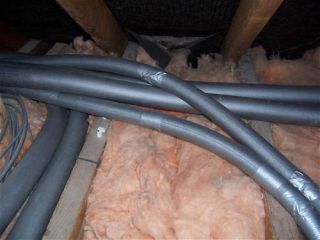Frozen pipes don't actually cause any problems unless they have water in them. Water expands when frozen!, I know you probably learnt in physics that heat makes things expand and freezing something makes it contract but with water it is different, it expands when frozen and also expands when heated.Drains in sinks can easily become frozen making it impossible for water to pass through the pipes, if this is the case try pouring some salt down the drain (about a table spoon to start) and give it 15 minutes or so before repeating. Salt is very good at melting ice, that's why rock salt is used on the public roads and highways when the temperature is low. Do Not be tempted to pour salt on your windscreen though to melt the ice as this causes the screen to stain really badly.
If a water pipe is frozen it can be thawed very carefully with a hairdryer or a heat gun but work very slowly and cautiously, ensure you start at the end of the pipe and not in the middle as trapped water can expand and cause the pipe to burst and ensure that if there is a tap on the end of the pipe that it is open. Do not apply too much heat to a frozen tap or you risk damaging the washer. Do not use a blowtorch unless you really have to especially on plastic pipes as they will easily melt.

An hair dryer or a heat gun can be used to thaw frozen pipes but great care must be taken. It's important to start to heat the pipe gently at an open end.

The only way to stop the pipes from freezing is to insulate them with some suitable insulation, this prevents the cold air from reaching the pipes and cooling them sufficiently enough to freeze.



